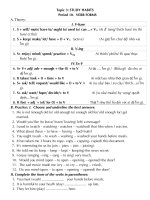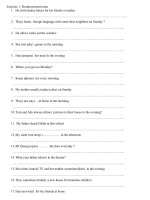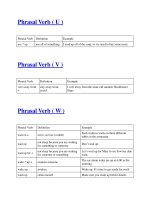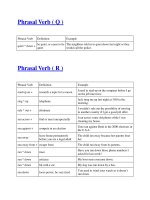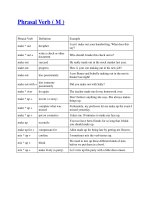Modal Verb Exercise.doc
Bạn đang xem bản rút gọn của tài liệu. Xem và tải ngay bản đầy đủ của tài liệu tại đây (152.55 KB, 8 trang )
Part 1
MODAL VERBS ( Động từ khiếm khuyết )
A. Form : Modal Verbs ( can /could / may / might / will / would ) + V
B. Use :
a. Can ( quá khứ là could ) : chỉ một khả năng hoặc cơ hội làm đều gì đó,
nghĩa là “ có thể”.
Ex :
- Tom can play three musical intruments.
- In the past, people could hardly travel easily.
b. may / might : diễn đạt điều gì đó có thể là thật hoặc điều gì đó có lẽ
xảy ra.
Ex :
- It may / might be a bomb.
- She may / might be at home today.
c. should ( not ) : chỉ lời khuyên ( nên hay không nên )
Ex :
- You should not smoke so much. It is not good for you.
d. Must: chỉ sự bắt buộc ( phải ), must not chỉ sự cấm đốn khơng được
phép.
Ex :
- You haven’t got much time. You must hurry.
- You can tell Tom what I said but he mustn’t tell anybody else.
e. Need ( cần ) # needn’t = don’t need ( không cần )
Ex : You have got plenty of time. You don’t need to hurry ( You needn’t
hurry )
Notes :
1. Câu đề nghị : Can you …. ? Could you …. ? hoặc May I …. ?
Ex :
Could you please open the window ?
May I read your newspaper ?
2. Một số cách biến đổi tương đương :
- be necessary ( for O ) + to – V = need ( not )
Ex :
It is unnecessary for him to study many subjects.
He needn’t study many subjects / He does not need to study
many subjects.
- be possible / probable + to – V hoac maybe + perhaps = can /
may + V
Ex :
Maybe your answer is right = Your anwer may be right.
3. Modals + have + V3,ed :
- Could have + P.P: rất có thể đã (diễn tả 1 khả năng đã có trong quá khứ,
nhưng chưa được sử dụng tới).
- May / might / can / could ( not ) + have + V3,ed : Có thể, có lẽ đã xảy ra
ở quá khứ.
Needn’t have + V3/ ed : something was done but it was not necessary (lẽ
ra không cần thiết phải làm , nhưng đã làm rồi)
Ex : Ann bought some eggs but when she got home she found that she
already had plenty of eggs . So she needn’t have bought any eggs
should have + V3 / ed : the wrong thing was done ( lẽ ra nên làm nhưng đã
không làm )
Ex : I ate so much chocolate so I am feeling sick . I shouldn’t have eaten so
much chocolate
- Must( not ) + have + V3,ed : Ắt hẳn đã xảy ra ( không xảy ra ) ở quá khứ.
NOTE
Must + S + V + …?
Yes , S + must
No , S + needn’t ( không cần thiết )
4.Câu hỏi và trả lờii và trả lời lờii
Suggestion / permission
- May I ………………………?
- Could I…………..( please ) ?
- Can I ……………………..?
- Would you ……( please )?
- Could you ……..( please ) ?
- Can you ………………….?
- Would you mind + Ving …..?
Response
- Certainly / Of course
- Yes , certainly
- Yes , of course
- Yes , I’d be happy to
- Yes , I’d be glad to
- Certainly
- I’d like to , but ………
- No , not at all
- No , of course not
- No, that would be fine
MODAL VERBS
EXERCISE
1. Nancy was refused to be given a scholarship to study abroad two days ago.
She
A
B
C
could have been very sad.
D
2. There is no parking sign here so you would better take your car out of here
now.
A
B
C
D
3. If you are free today, you will join our party at the club.
A
B
C
D
4. The company is going to held a party to celebrate the establishment .
A
B
C
D
5. The manager would dismiss his secretary if the secretary makes such stupid
mistakes
A
B
C
in the reports.
D
6. The little girl says that her parents have been out but she could contact them
easily
A
B
C
D
7. The men are able work better than they did last year.
A
B
C
D
8. When we were children, we use to climb over the wall to get into the
neighbor’s garden.
A
B
C
D
9. If the boy had come home last night, he will have seen a gift lying on the
table.
A
B
C
D
10. The New Year’s Eve party can be held in a person’s house to celebrate the
changing
A
B
C
of the calendar next week.
D
11. Do you please tell us the way to the nearest post office here?
A
B
C
D
12. When you feel tired of working so hard, you will take a break to relax.
A
B
C
D
13. There is a No Parking sign, so you won’t park your car here.
A
B
C
D
14. You have to be hurry if you do not want to miss the last bus.
A
B
C
D
15. The man is very intelligent because he is able to speak five languages.
A
B
C
D
16. You have to do your homework every day.
A. Your homework has been done every day.
B Your homework has to do by you every day.
C Your homework has to be done every day.
D Your homework have to be done every day.
17. You shouldn’t tell her the news. It might kill her.
A. She shouldn’t be told by the news. She might be killed.
B. The news shouldn’t be told her. She might be killed.
C. She shouldn’t be told the news. She might be killed.
D. She shouldn’t been told the news. It might be killed.
18. It wasn't obligatory to submit my assignment today.
A. My assignment must have been submitted today.
B. I needn't have submitted my assignment today.
C. My assignment was required to submit by today.
D. I mustn't submit my assignment today.
19. It's time we left for the disco.
A. We may leave for the disco now.
B. We needn't leave for the
disco now.
C. We should leave for the disco now.
D. We must have left for the
disco now.
20. It was a mistake of you to lose your passport.
A. You shouldn't have lost your passport.
B. There must be a mistake in your passport.
C. You needn't have brought your passport.
D. Your passport must be lost.
21. My car keys are possibly in the kitchen.
A. My car keys should be put in the kitchen.
B. My car keys cannot be in the kitchen.
C. I don’t know whether my car keys are in the kitchen.
D. My car keys might be in the kitchen.
22. Is it possible for me to come to your house at about 7pm?
A. Must I come over to your house at about 7pm?
B. Could I be coming to your house at about 7pm?
C. Can I come to your house at about 7pm?
D. Will I come to your house at about 7pm?
23. You must never take off your helmet while you are riding a motorcycle.
A. If you are riding a motorcycle, you needn’t wear a helmet.
B. When you are riding a motorcycle, wearing a helmet is not a must.
C. You needn’t wear a helmet whenever you are riding a motorcycle
D. Helmets must be worn at all times when you are riding a motorcycle
24. I have done this math problem at least twenty times, but my answer is
wrong according to the answer key.
A. The answer in the book should be wrong!
B. The book needn't have a wrong answer.
C. There is a wrong answer in the book.
D. The answer in the book must be wrong!
25. Can you tell me directions for the station near here?
A. Would you tell me where to get to the station near here?
B. Could you tell me how to get to the station near here?
C. Could you tell me what to get to the station near here?
D. Must you tell me the way to get to the station near here?
26. A: John passed his exam with a distinction.
B: _______.
A. He was too lazy to succeed
B. He can't have studied very
hard
C. He must have studied very hard
D. He needs studying
harder
27. I often get up early in the morning.
A. I’m used to getting up early in the morning
B. I’m used to get up early in the morning.
C. I used to get up early in the morning
D. I used to getting up early in the morning.
28. Please don’t use the shower after midnight
A. Would you mind not to use the shower?
B. Would you like to use the shower before midnight?
C. I don’t want you to use the shower.
D. Would you mind not using the shower after midnight?
29. The carpet still needs cleaning.
A. The carpet has been cleaned.
B. The carpet hasn’t
cleaned yet.
C. The carpet has not been cleaned.
D. The carpet has
cleaned.
30. I prefer going out for a meal to staying at home.
A. I’d like to go out for a meal.
B. Going out for a meal is very interesting.
C. I’d rather go out for a meal than stay at home.
D. Staying at home is more boring than going out for a meal.
31. He said that he _________ enter the examination room because he was late.
A. mustn’t
B. couldn’t
C. needn’t
D. might not
32. “__________ taking me downtown on your way to work this morning?” –
Not at all.
A. Can you B. Why don’t you C. Could you please
D. Would
you mind
33. You haven’t eaten anything since yesterday afternoon. You ______ be
really hungry!
A. must
B. might
C. will
D. can
34. “Why are you so late?” – I _________ take my aunt to the airport. The
traffic was terrible!”
A. might
B. could
C. had to
D. should
35. I wonder who drank all the milk yesterday. It _____ have been Mary
because she was out all day.
A. can’t
B. must
C. could
D. needn’t
36. Susan ___________ hear the speaker because the crowd was cheering so
loudly.
A. might not
B. couldn’t
C. can’t
D.
mustn’t
37. Ted’s flight from Britain took more than 11 hours. He _____ be exhausted
after such a long flight.
A. had better
B. can
C. must
D.
should
38. You ___________ do the job if you didn’t speak Japanese fluently.
A. couldn’t
B. can’t
C. won’t be able to
D.
needn’t
39. When I was young, I __________ go fishing with my father.
A. was used to
B. would
C. may
D.
used to
40. You ________ take along some cash. The restaurant may not accept credit
cards.
A. has to
B. had better
C. can
D. could
41. Your wedding ring is very precious. You ___________ lose it.
A. must
B. could
C. needn’t
D.
mustn’t
42. “How old do you think Peter is?” - “I just looked at his driver’s license. He
______ 33.”
A. might be
B. may be
C. must be
D.
should be
43. It ________ rain this evening. Why don’t you take an umbrella?
A. had better
B. might
C. must
D.
could
44. You ________ forget to pay the rent tomorrow. The landlord is very strict
about paying on time.
A. don’t have to
B. mustn’t
C. couldn’t
D.
can’t
45. It’s a school rule. All the students _________ wear a uniform.
A. have to
B. might
C. must
D.
need
46. Passengers _______ smoke until the signs have been switched off.
A. mustn't
B. can't
C. needn't
D. mightn't
47. We must obey the traffic laws. Otherwise, we __________ be punished.
A. will
B. might
C. should
D. need
48. This is the key. You _________ forget to take it with you when going out.
A. should
B. have to
C. mustn’t
D. needn’t
49. You _________ introduce me to Dr. Gray. We have already met.
A. shouldn’t
B. needn’t
C. mustn’t
D. couldn’t
50. “I have got a headache.” – “You _________ go to see the doctor.”
A. may
B. could
C. should
D. might
KEY TO MODAL VERBS
1.D
11.A
21.D
31.B
41.D
2. C
12. C
22. C
32. D
42. C
3.C
13.C
23.D
33.A
43.B
4. B
14. A
24. D
34. C
44. B
5. A
15. D
25. B
35. A
45. C
6. C
16. C
26. C
36. B
46. A
7. B
17. C
27. A
37. C
47. A
8. B
18. B
28. D
38. A
48. C
9. C
19. C
29. C
39. D
49. B
10. B
20. A
30. C
40. B
50. C


